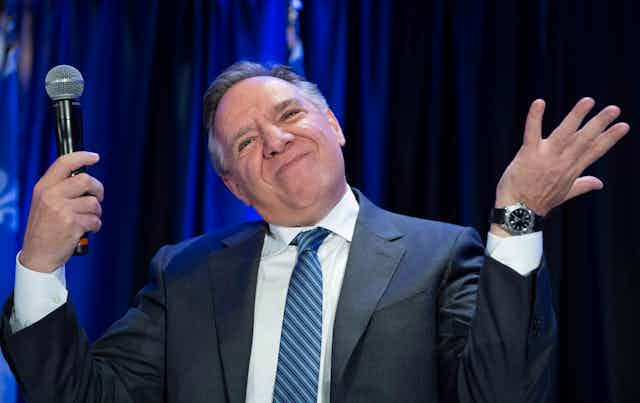Newly elected Quebec Premier François Legault has announced his intent to use Section 33 of the Constitution of Canada, more often referred to as the notwithstanding clause, to prohibit civil servants from wearing religious symbols when interacting with the public.
It’s an alarming announcement to me, as a lawyer and faculty member at a law school. Here’s why.
Legault’s invocation of the clause, just weeks after Ontario Premier Doug Ford’s ultimately unnecessary threat to use it in his legal battle to shrink the size of Toronto city council, sent a signal to the prime minister and other premiers: Ontario and Quebec do not play by the rules.
Legault issued his threat even earlier out of the gates than Ford did, following a similarly stunning provincial election result.
He’s musing about using the notwithstanding clause to short-circuit the Supreme Court of Canada and the Charter of Rights and Freedoms on a matter of fundamental religious freedom and freedom of expression.
Read more: New premier, same old story: Québec's longtime anti-niqab efforts
While the two NDP governments in British Columbia and Alberta duke it out over pipelines on the West Coast, central Canada is threatening the tenets of democracy.
Right-wing populism
The early signals of both the Ford and Legault premierships suggest that Canada’s two largest provinces have fallen under the spell of a right-wing populism of the type associated with Donald Trump and Brexit.
Central to this style of politics is its total disregard for the rule of law on the premise that their government’s electoral mandate means that they can do whatever they please, including exerting their will over municipal governments.
Have no illusions, this is an authoritarian tendency and presents a clear and present danger to the rule of law. In Canada, the most obvious avenue of expression for this tendency is through the invocation of the notwithstanding clause.
An attempt to marry the rule of law with right-wing populism has played out to a rapt global audience in the debacle surrounding the Trump administration’s nomination of Judge Brett Kavanaugh.
Culture wars
Although the cultural politics of America are different than they are in Canada, no country is closer to the U.S. economically and socially than Canada. Pierre Trudeau’s old adage about the mouse at the foot of the elephant, and the old saying about American sneezing and Canada catching a cold, are true.
Read more: Doug Ford's attack on the 'Court Party'
In fact, in the context of globalization, America’s realities are generalities. So much so, the current mainstreaming of extremist populist politics not only in the Anglo-American world, but across the globe, is borne out by the evidence.
Freedom House, a well-respected and still objective U.S. government agency with a storied history that advocates for democracy and human rights, describes 2017 as the 12th consecutive year of decline in global freedom as measured by net declines in political rights and civil liberties in 71 countries with only 35 registering gains.
It will be interesting to see how things look in 2018. I am not optimistic.
Right-wing, often xenophobic and nationalist politics characteristic of downward trends in global democracy and the rule of law are apparently beginning to thrive in Canada. Wherever there is a declared willingness of elected officials to escape, short- circuit or otherwise undermine courts, Constitutions and established standards of conduct, alarm bells should sound.
It’s essential for Canadians to understand we’re not immune from similar abuses of our institutions and our laws. Today, what we see occurring in Trump’s America is part of an alarming global tendency. It can happen here and anywhere.
‘Nativist, reactionary’
Although some commentators have celebrated the apparent demise of the Parti Quebecois in that province’s recent election, the Legault victory speaks to some of the most nativist and reactionary impulses of Quebecers by redirecting popular politics along the lines of ethnic rather than civic nationalism.
We must not be smug or look down at Americans for their crass political culture and race to the bottom. I worry that what we’re now experiencing in Canada’s two major provinces is an expression of a similar downward trajectory at highest level of our politics.
As a federal election looms next fall, Canadians must be alert to the risk posed to our entire legal and constitutional order if the notwithstanding clause is routinely invoked and used to short-circuit the application of Charter rights in Canada’s most populous provinces.
The notwithstanding clause is a dangerous defect in Canada’s legal order. Absent a convention of not triggering it routinely, there would indeed be a constitutional crisis. A constitutional crisis occurs when it is no longer certain whether the Constitution can be relied upon and courts’ judgements enforced.
In many countries, including our own, we are on the brink of just such a crisis.

